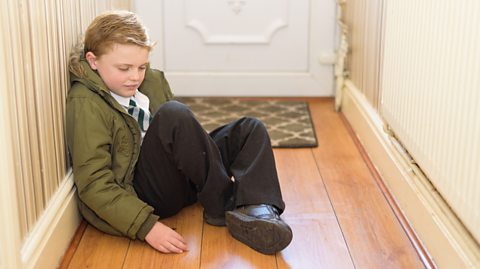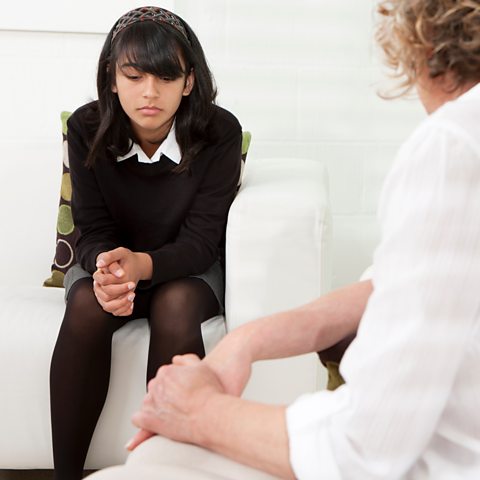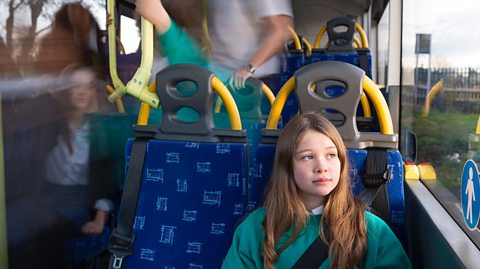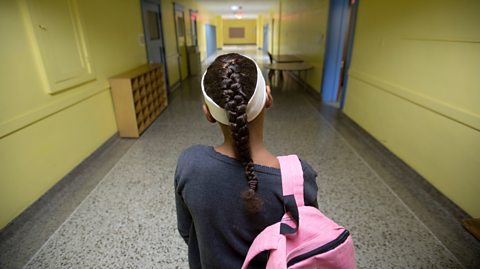School phobia, or school-related anxiety ā sometimes called 'school refusal' ā is when your child feels fearful or anxious about school and/or is unable to go to school. Itās also referred to as emotionally-based school avoidance (EBSA) or anxiety-related absence.
It can happen at any age, and it can be more common among children with additional or special educational needs (SEN). There can be many reasons why your child might experience school anxiety, but dealing with it can be stressful for you as a parent, as well as your child.
Parents' Toolkit has teamed up with educational psychologist Dr Amanda Furness and SEN advisory teacher Sarah Barton to give you advice on how to handle 'school refusal' and where to go for help.
What is 'school refusal'?

āSchool refusalā is a catch-all term often used to describe when a child is anxious about or unable to attend school.
Dr Amanda Furness points out the term can be misleading because, āit implies that children and young people are making a choice not to attendā, whereas in reality there are likely to be many interacting contributing factors. Therefore many people prefer to call it emotionally-based school avoidance (EBSA).
Thereās some evidence to suggest more pupils have experienced challenges getting in to school since the Covid-19 pandemic. In the autumn term of 2021, almost 1.7m children missed seven days of school or more. Even allowing for some Covid disruption, that figure is significantly higher than before the pandemic.
Dr Furness says difficulties attending school, whether primary or secondary, ācan happen suddenly or build over timeā and ācan be very complex and are likely to be due to a range of interactive factorsā. However, reasons for not wanting to go back in can include anxieties aroundā¦
- social and/or work pressures at school
- difficulties maintaining positive relationships with peers or staff
- unmet needs (eg: additional needs or feeling unsafe)
- home and/or family factors
- sensory needs making the environment feel overwhelming
Other reasons include a range of socioeconomic factors, plus some parents choosing to electively home educate their children because they feel their childās needs were no longer being met in school.
“óĻó“«Ć½ News has reported that some schools have even started picking kids up from home to boost attendance.
How school anxiety might show up at home

Dr Furness says: āItās common for young people who feel unable to attend school to experience heightened anxiety,ā but it might not always show up in a "typical wayā. Some ways you might spot it in your child includeā¦
- not wanting to get up, get ready or go to school
- anxiety and heightened emotions when getting ready to leave for school
- physical symptoms like headaches, stomach ache or feeling sick
- a change in behaviour either by becoming more withdrawn or acting out more
- trouble sleeping or getting to sleep
- not doing schoolwork or performing worse at school
- not going into school without telling you
When a child elects not to go to school it can have a knock on effect for others - especially for a parent or carer who may then have to stay off work, but the resulting stress can then exacerbate feelings of guilt or worry in the child.

How to help your child
It can be a worrying time for you as a parent, so go easy on yourself and your child. The most important thing is to listen to your child and to try and be calm, patient and show empathy. Itās also important to look after yourself and seek support when you need it.
Dr Furness says start by working together with your child and their school to identify patterns or possible triggers.
Consider whether there are any current social difficulties or learning challenges, or if there have been any events or triggers that could have caused a change in the way the child feels about school."
"Itās important to have open and non-confrontational conversations with young people about what theyāre finding difficult, remembering that they may not be able to verbalise this fully themselves."
Start talking to your childās school as early as you can. āMost schools will suggest talking with the class teacher first, and this can be escalated to the school Special Educational Needs and Disability Coordinator (SENDCo), who will be able to advise on support. Also - have open conversations with school staff who monitor attendance.ā
If your child is able to make it into school, you can still support them by talking through the school day and discussing what might help at each stage, linking them up with a pastoral staff member and/or peer buddy at school, providing a safe space for them within school, and having a ātime-outā or āexitā card they can use in class if they feel anxious.
Some children may also benefit from extra responsibilities at school, or involvement in sport or extracurricular activities. Discuss what might work best with your childās teacher or SENDCo.

If your child isnāt able to get into school, avoid arguing with them and be supportive of any small achievements they make, like putting their uniform on or walking to the school gates, even if they canāt go in.
Keep in regular contact with school and work with them on strategies to help your child, including work for them to do at home if necessary. Keep a note of your correspondence as you may be asked to provide evidence that your child isnāt well enough to be in school.
Sarah Barton works with children and parents in Rochdale whoāve decided to electively home educate their child, often due to emotionally-based school avoidance. She advises getting help whilst your child is still enrolled at schoolā¦
āSee whatās available at your local Child and Adolescent Mental Health Service (CAMHS) ā do they have a drop-in centre? Look into local charities like Thrive that can support you. Talk to school about what support will look like, how it can be measured ā in terms of goal-setting ā and how youāll adjust things as you go along.ā
Get in touch with CAMHS as early as possible if you have any concerns about your childās mental health - waiting times for CAHMS have risen since the pandemic with the average wait last year being more than two months, topping eight months in some areas. Our mental health first aid kit for parents can guide you through steps to take and offers some things you can do whilst you and your child are waiting to access these services.
Itās also worth making an appointment with your GP to check for any neurological issues and to discuss next steps.
Children with special educational needs (SEN)

Dr Furness says children with special educational needs (SEN), "may experience heightened anxiety due to social factors, environmental factors (e.g. sensory needs), or learning barriers."
"Some children with social, emotional and mental health needs can experience high levels of stress. They may mask these needs in school and show them more at home until theyāre no longer able to maintain their masking. This often leads to a seemingly sudden change in their attendance or behaviour."
Take things slowly with your child and gradually introduce tasks for them to complete, to help them get to school or cope once theyāre in school.
Whilst each childās needs will be individual to them, Dr Furness recommends identifying a āsafe placeā and āsafe adultā in school, particularly around transitions. āIf you know your child is anxious about school, be proactive in getting support in place before this escalates. Work with the SENDCo to identify potential barriers and reasonable adjustments that can be made.ā
Sarah Barton adds: āTalk to the school about a bespoke support package for your child, for example: who do they report to when they get into school? Should we have a phone call with the family at the end of the day? What plan is in place if your child doesnāt go in that day?ā
You can also apply to your local authority for an which will work out your childās educational, health and/or social needs and set out the additional support needed to meet those needs.
Other things you can do
Dr Furness says support will look different for each child, but some ideas includeā¦
- Ensure each day is a fresh start. Often pupils whoāve been unable to attend school then feel they canāt reintegrate.
- Try to avoid a āshame cycleā. Acknowledge their difficulty, validate their feelings and explain that you can work together to overcome barriers.
- Work with the school to identify learning that can be done at home. This will help to ensure that your child doesn't feel like theyāve fallen behind too much.
- Be proactive in lowering baseline levels of anxiety. For example, through mindfulness activities around transition points.

Further help and information
This Parents' Toolkit collection has advice on helping with anxiety.
Make a mental health support network.
The National Autistic Society have .
In Scotland, Connect is a charity offering advice .
For deeper reading - the Welsh Government published a on the implications of covid on attendance.
Charity Young Minds have further advice on school anxiety and refusal

More from “óĻó“«Ć½ Bitesize Parents' Toolkitā¦
Parents' Toolkit
Fun activities, real-life stories, wellbeing support and loads of helpful advice - we're here for you and your child.

Parents Konnie Huq and Harry Judd talk bullying. collectionParents Konnie Huq and Harry Judd talk bullying.
A collection of articles & films - Konnie and Harry talk about their experiences alongside expert tips from the Anti-Bullying Alliance.

Mental health first aid kit for parents: Who to ask and what to do
Worried that your child needs help with their mental health? Here's how you can access professional help and support your child while you wait.

Five tips to support the after-school āmeltdownā
Expert advice on how to cope with after-school restraint collapse as a parent.

How to support and equip parents to talk about their childās mental health
Consultant child educational psychologist Laverne Antrobus has tips to support parents in talking about mental health with a child.

How to support your child through difficult behaviours
Life coach Aisha, who supported the young candidates on Idris Elba's Fight School, explains how parents can avoid rows and start productive conversations.
